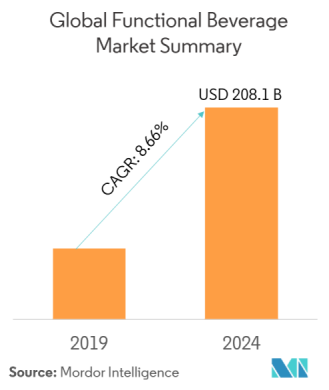THE FUNCTIONAL BEVERAGE BOOM
/THE FUNCTIONAL BEVERAGE BOOM
The functional beverage market is forecasted to reach $208.13 billion by 2024. Global functional beverage consumption is driven by the consumer’s inclination toward non-alcoholic beverages. Low sugar, plant-based, functional beverages such as Kombucha, continue to boom and are preferred over fruit juices and carbonated drinks. The Kombucha market alone increased by nearly 41% to $534 million in 2017, and is expected to be worth $1.8 billion by 2020.
A RISE IN DEMAND
New ingredients such as mushrooms, cannabis MCT oil, and pre/probiotics have boosted the creation of these innovative “functional” beverages. And manufacturers are embracing innovation in a bid to gain a position in the market. Functional beverages assist in enhancing bodily health, such as improving the immune system, heart rate, digestive health, and weight management. As Mordor Intelligence found: “consumers are developing an affinity for functional beverages which offer enhanced convenience, thereby providing suitable, convenient, and healthy alternative to soft drinks” (FUNCTIONAL BEVERAGE MARKET - GROWTH, TRENDS, AND FORECAST 2019 - 2024). Growing demand from the millennial generation, and their increased focus on wellness awareness, coupled with increasingly busy lifestyles, have also led to an increase in demand.
ENERGY DRINKS
But it is the energy drink market which remains the fastest growing segment of the functional beverage industry, and is expected to reach $353.66 million by 2026. A 2018 report found that more than 40% of American teens in a survey had consumed an energy drink within the past three months. Another survey found that 28% of adolescents in the European Union had consumed these sorts of beverages in the past three days. Energy Drinks provide benefits which include “instant” energy, refreshment, increased attention span and improvement of reaction speeds. They typically contain taurine, caffeine, vitamins, glucuronolactone, proprietary blends, herbal extracts, and amino acids, which are marketed as products that boost physical stamina and mental alertness, offering their consumers a much-needed “boost”. However the media, and the scientific community, have expressed several safety concerns over consumption of these products, which has encouraged legislators to formulate different regulations and educational approaches to limit consumption of these products. Healthier alternatives such as green tea and ginger root tea may hamper future the market growth. And the inclination of consumers toward organic energy drinks is expected to create lucrative opportunities in the near future.
Are you a beverage manufacturer looking to accelerate your business? BOOK A DEMO of CASHMERE’S Food & Drink Enterprise Resource Planning software, and see how we can help you improve your production, supply chain, traceability and reporting.










